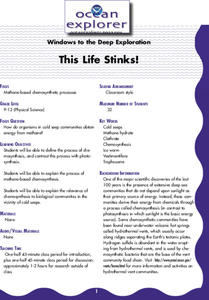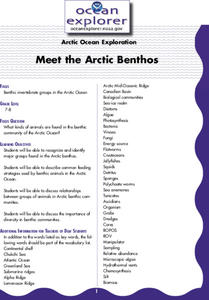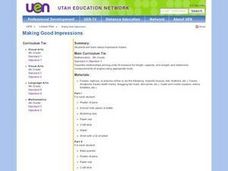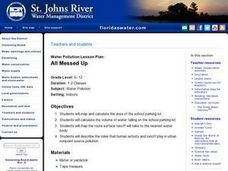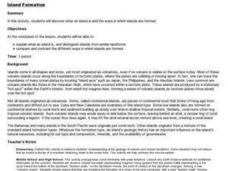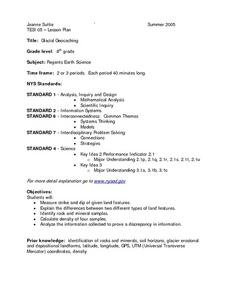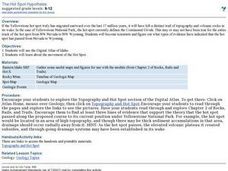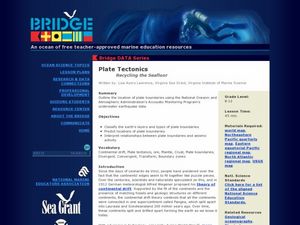Curated OER
Coal Formation
Students create a condition in an aquarium which allows the formation of coal. Students observe changes in decomposition and color of materials present in aquarium before a coal layer appears. Plant "fossil" imprints will be left behind.
Curated OER
Are You Thirsty: The Effects of Pollution on Drinking Water
Students discuss the different causes of water pollution. In this ecology instructional activity, students brainstorm ways to purify polluted water. They formulate their conclusion based on the results of the experiments.
Curated OER
This Life Stinks!
Young scholars explore the process of chemosynthesis and contrast this process with photosynthesis. They consider the relevance of chemosynthesis to biological communities in the vicinity of cold seeps.
Curated OER
Meet the Arctic Benthos
Learners recognize and identify major groups found in the Arctic benthos. They describe common feeding strategies used by benthic animals in the Arctic Ocean. They discuss relationships between
Curated OER
Bermuda Today: Who Were Its Geologic Ancestors?
Students explore how the island of Bermuda came to be.
Curated OER
Urban Impact on Chollas Creek (California): A Field Study
Students, in groups, take samples from a creek and keep a field journal on their samples. They also perform tests on their samples.
Curated OER
Making Good Impressions
Fourth graders participate in an experiment where they experiment with impression fossils. They identify and describe the measurable attributes of the impression fossils. There are many parts and materials for this experiment.
Curated OER
Superbugs
Students research deep sea communities and discover strategies for combating antimicrobial resistance and write reports on it. They consider overprescription and prophylactic uses of antibiotics as causes for their ineffectiveness.
Curated OER
Chronology: They Time of My Life
Students demonstrate the importance of intact information to achieve accuracy. They compare and constrast their timelines with the chronological information contained in a stratified archaeological site.
Curated OER
All Messed Up
Pupils begin the experiment by mapping and calculating their school parking lot. They calculate the volume of water falling on the lot and map the route the water runoff takes. They discuss the roles that humans play in affecting water...
Curated OER
Franklin Mountains
Students review the steps of the rock cycle. In groups, they identify the natural forces that cause weathering and erosion. They describe how sedimentary, metamorphic and igneous rocks might be formed in nature to end the lesson.
Curated OER
Island Formation
Students create models of how islands are formed by hot spots and then write a summary of their observations and of how they think their model relates to volcanic hot spots and island formation.
Curated OER
Glacial Geocaching
Eighth graders measure strike and dip of given land features and explain the difference between them. They also look at rock and mineral samples for indentification, along with calculating the density. Finally, information is analyzed...
Curated OER
Sea Secrets
Students study the following: For centuries, people have been challenged by the mysteries that lie beneath the blue depths of our ocean planet. Very little was known about the ocean until late in the nineteenth century, although nearly...
Curated OER
Human Impact on Water Quality
Learners identify at least three common repercussions of developing water front property on water quality. They describe three sources of water pollution. They research the organism striped bass and observe it if striped bass is available.
Curated OER
Science: Headline
Pupils are able to identify questions they need to answer to comprehend a specific news article. They are pushed to question how they know that their drinking water is safe.
Curated OER
Science: Not just Gold
Learners articulate a possible relationship between arsenic and gold deposits in a written statement using data to substantiate the relationship they describe. They use real data to determine the source of the arsenic in the drinking...
Curated OER
Petrology in the Gravel Pit
Students are introduced to a wide range of rock types when they examine pebbles and boulders exposed in a gravel pit. Students practice rock description and identification and categorize the rocks sedimentary, igneous, or metamorphic.
Curated OER
Sarita Wetland Restoration
Students collaborate on the plannng and implementation of the Sarita Wetland Restoration. The Sarita Wetland is the remnant of former Lake Sarita that was drained in the early 1900's. The goal of the entire project is to improve water...
Curated OER
Floodplains in the field (with GIS)
Students measure a topographic and geologic cross-section across a floodplain by simple surveying and auguring techniques. They consider the spatial context of the field observations, use GPS measurements, and desktop GIS analyses.
Curated OER
and and Ocean Views of Earth by Remote Sensing
Students explain how satellites help scientists to see more than with the unaided eye and how Landsat technology works. Students identify vegetation and fire sites in the rainforest and detect erosion along rivers. They are able to use...
Curated OER
The Hot Spot Hypothesis
Students use a digital atlas, geologic maps, and topography maps to explore geologic regions of Yellow Stone National Park. They locate evidence that support the theory of hot spots. Students research and explore the movements of Hot...
Curated OER
Plate Tectonics: Recycling the Seafloor
Students classify earth's layers and plates using Ocean Seismicity data. For this plate tectonics lesson, students outline where the plate boundaries are on the world map. They then compare these predicted boundaries with USGS map of the...




